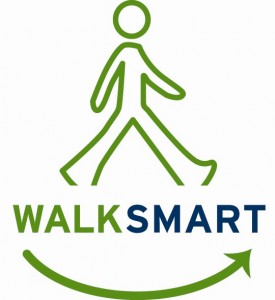The Impact of Physical Activity on the Brain
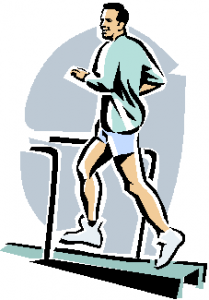 Here in the Next Brain Blog we have reviewed many studies that demonstrate the impact physical activity has on brain function and cognitive performance. For example:
Here in the Next Brain Blog we have reviewed many studies that demonstrate the impact physical activity has on brain function and cognitive performance. For example:
Instant Memory Boost from Six Minutes of Exercise
Tai Chi Boosts Brain Volume and Performance
Exercise Once Weekly Helps Avoid Mental Decline
Short Weekly Walks Improve Intelligence
to list a few. And if that is not enough to convince you to include physical activity as part of your brain training efforts, a review of multiple research studies presented at a recent meeting of the American Association for the Advancement of Science found:
“Dozens of studies now show that aerobic exercise can increase the size of critical brain structures and improve cognition in children and older adults.”
I am interested to hear from readers that use physical activity to improve brain function and cognitive performance. What activities do you do? How frequent do you do them?
Categories: Child, Cognitive Decline, Lifestyle, Memory and Learning, Older Adult Tags: exercise
Exercise Once Weekly Helps Avoid Mental Decline
While the Next Brain Blog is dedicated to techniques that improve brain function and enhance cognitive performance, I get a lot of email asking about ways to protect or maintain existing brain health. Fortunately, many techniques work both ways. They will boost your brain power or simply protect what you have depending on your age and the intensity of implementation.
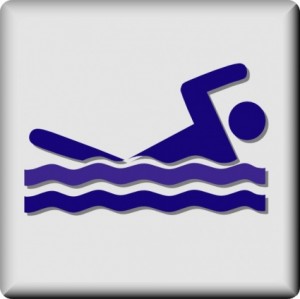 Take for example a recent study led by the Mayo Clinic that looked at the role of exercise and computer use in avoiding mild cognitive impairment in older adults. A key finding:
Take for example a recent study led by the Mayo Clinic that looked at the role of exercise and computer use in avoiding mild cognitive impairment in older adults. A key finding:
“Even exercising once a week was beneficial. Most of the participants seeing the greatest benefits were exercising five to six times a week combined with computer activity,” says Geda.
The benefit in this case is avoiding age-related memory loss.
On the other hand, walking and exercise has been found to improve cognitive performance not just avoid memory loss. In one example participants had to walk at least 3 times a week for 40 minutes.
Perhaps the habits we develop to boost our intelligence will also be the habits that we need to maintain brain health as we age.
Categories: Cognitive Decline, Lifestyle, Older Adult Tags: exercise
How to Get Two More Years of Brain Health
 Here on the Next Brain Blog I have posted several times on the value of taking a walk for stimulating thinking, lowering stress and forestalling the effects of age-related cognitive decline. Even small amounts of walking can produce dramatic results. For example, check out the new research from University of Illinois at Urbana-Champaign that found:
Here on the Next Brain Blog I have posted several times on the value of taking a walk for stimulating thinking, lowering stress and forestalling the effects of age-related cognitive decline. Even small amounts of walking can produce dramatic results. For example, check out the new research from University of Illinois at Urbana-Champaign that found:
Walking 40 minutes three times a week on a regular basis increases the size of your hippocampus (area of brain where memories form) and effectively slows normal cognitive decline by two years in adults ages 50 to 80 years.
This is a powerful finding because normally our hippocampus decreases in volume 1-2% per year as we age.
Categories: Cognitive Decline, Lifestyle, Memory and Learning, Older Adult Tags: exercise
The Science of Building a Better Brain
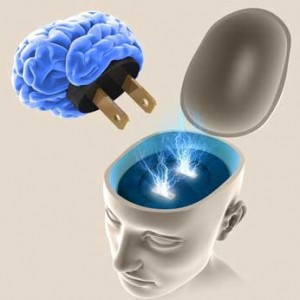 Newsweek did a great job of summarizing the findings from the cognitive enhancement strategies workshop held at the 2010 annual meeting of the Society of Neuroscience. The article, Can You Build a Better Brain? uses the latest neuroscience to differentiate between techniques that work and those that don’t. Techniques for improving brain function and enhancing cognitive performance that have strong scientific support include:
Newsweek did a great job of summarizing the findings from the cognitive enhancement strategies workshop held at the 2010 annual meeting of the Society of Neuroscience. The article, Can You Build a Better Brain? uses the latest neuroscience to differentiate between techniques that work and those that don’t. Techniques for improving brain function and enhancing cognitive performance that have strong scientific support include:
- Drugs that boost dopamine levels such as caffeine
- Regular aerobic exercise
- Meditation training
- Activities that boost mood and confidence
- Action-oriented video games
- Cognitive training software but only for the tasks done using the software
All of these techniques have been covered in the Next Brain Blog. Techniques that don’t appear to have strong evidence include, and I quote:
“Vitamins B6, B12, and E; beta carotene; folic acid; and the trendy antioxidants called flavenoids are all busts, and the evidence for alcohol, omega-3s (the fatty acids in fish), or having a large social network is weak. The Mediterranean diet is associated with a lower risk of cognitive decline, find observational studies, but that hasn’t been confirmed in more rigorous, randomized controlled studies, and no one knows whether the benefit comes from what the diet includes (olive oil, fish, vegetables, wine) or what it excludes (red meat, refined sugars, dairy fat). Statins don’t help, and neither do estrogen or NSAIDs (aspirin, ibuprofen).”
Although some of these have supporting studies they lack a clear causal connection to brain plasticity or other currently understood mechanism of cognition.
Categories: Other Tags: brain training, exercise, games, meditation, mindfulness, Mindset, vitamins
Walking 6 Miles a Week Reduces Chances of Memory Loss By Half
 We all know exercise is a good for the brain. But what types should I do, how much and what benefits can I expect? We try and answer these questions in the Next Brain Blog by looking at the latest scientific studies.
We all know exercise is a good for the brain. But what types should I do, how much and what benefits can I expect? We try and answer these questions in the Next Brain Blog by looking at the latest scientific studies.
Take for example the study published by Kirk I. Erickson in the October 13th issue of Neurology Online and reported by Web MD as Walking May Ward Off Memory Loss. The study found walking 72 blocks per week or approximately 6-9 miles early in life can actually increase the volume of grey matter in the brain and avoid shrinkage-related memory problems. Furthermore,
“Researchers say those who walked the most cut their risk of developing memory loss in half.”
This effective was found in dementia free older adults and measured over a period of nine years.
Categories: Cognitive Decline, Lifestyle, Older Adult Tags: exercise
Short Walks Weekly Improve Intelligence
40 Minute Walks 3 Times Per Week at Your Own Pace Measurably Boost Brain Function.
In response to an early post a reader sent me a link to this article – A gentle Stroll can Boost Intelligence. It reports on a study conducted with 100 sedentary adults (self-confessed couch potatoes) that started to walk regularly at their own pace 3 times a week for six months. To make the study interesting the researchers had part of the group do the walking and others do stretching and toning exercises. Here is what they found:
“The walkers also had increased connectivity in the part of the brain which helps in the performance of complex tasks and they did significantly better on cognitive tests than their toning and stretching peers.”
This means mild aerobic exercise can change the wiring of your brain and improve cognitive performance. The effect was especially pronounced in the older adults in the study.
Categories: Lifestyle, Older Adult, Problem Solving Tags: exercise
Slow But Steady to Win Brain Health Race?
 Making small changes to our daily activities can make a big difference over the years. Often called lifestyle tuning, this approach can be applied to build brain health and improve your cognitive performance. We have covered many tunning techniques on the Next Brain Blog.
Making small changes to our daily activities can make a big difference over the years. Often called lifestyle tuning, this approach can be applied to build brain health and improve your cognitive performance. We have covered many tunning techniques on the Next Brain Blog.
Posit Science, a leader in brain training software, offers 14 Brain Training Tips. They range in change magnitude from walking on rough surfaces to eating fish and learning to play a musical instrument. Here are the ones that are easy-to-do lifestyle tuneups:
4. Exercise Your Peripheral Vision
13. Walk on a Cobblestone Path
Although we don’t have research that proves lifestyle tuneups produce lasting improvements in brain health and cognitive performance, we do have such research for cardiovascular health. For example, taking stairs instead of an escalator or a 10 minute walk does in fact improve heart health. My bet is that analogous lifestyle tuneups for the brain will improve cognitive performance.
Interested to hear about your techniques for taking a slow but steady approach to the changes needed to improve brain function and cognitive performance
Categories: Diet, Lifestyle, Mental Focus, Perception Tags: brain training, cognitive fitness, exercise
Tai Chi for Cognitive Training?
Tai Chi is an ancient Chinese practice for linking mind and body in a martial art. Today it is a low-impact form of exercise and wellness that may improve a number of cognitive functions including mental focus, memory, managing emotions and perception.
Tai Chi involves a series of fluid, slow-paced motions and stretches that have been described as “meditation in motion”. The benefits of Tai Chi have just started to be formally studied. An in depth article on the Mayo Clinic website, Tai Chi: Discover the many possible health benefits, reports there is preliminary evidence for these benefits:
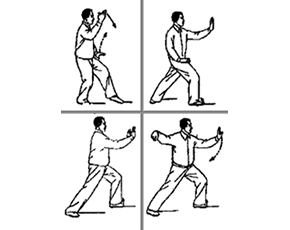 Reducing anxiety and depression
Reducing anxiety and depression- Improving balance, flexibility and muscle strength
- Reducing falls in older adults
- Improving sleep quality
- Lowering blood pressure
- Improving cardiovascular fitness in older adult
- Relieving chronic pain
- Increasing energy, endurance and agility
- Improving overall feelings of well-being
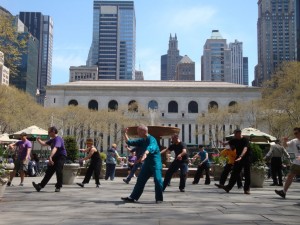 Clearly these benefits go beyond improving brain function and cognitive performance. Getting started in Tai Chi is not hard. There are many fine resources available for little cost. You can produce results in as little as 8-12 weeks.
Clearly these benefits go beyond improving brain function and cognitive performance. Getting started in Tai Chi is not hard. There are many fine resources available for little cost. You can produce results in as little as 8-12 weeks.
Check out this 5 minute free video for a decent introduction. It won’t make you an expert but it should be enough to determine if you want to try more. There is a product pitch but it is soft.
I am interested in readers’ suggestions for resources for learning Tai Chi, especially those that emphasize improving brain function and cognitive performance.
Categories: Ancient Ways, Manage Emotions, Memory and Learning, Mental Focus, Perception, Training Tags: cognitive fitness, embodied cognition, exercise
Double Dip: Take A Ride on the Brain Bike
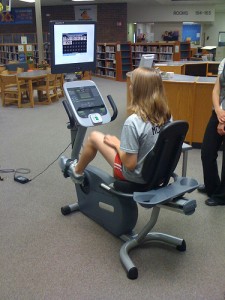 Physical exercise, especially cardio, is good technique for improving brain function. There is no doubt about that. So is specially designed cognitive training software that gives your brain a workout by solving problems, meeting perceptual challenges and even playing games. Imagine combining the two – exercising while working with cognitive training software – to get a double dose of brain training in a single session. That is exactly what the NeuroActive Bike does.
Physical exercise, especially cardio, is good technique for improving brain function. There is no doubt about that. So is specially designed cognitive training software that gives your brain a workout by solving problems, meeting perceptual challenges and even playing games. Imagine combining the two – exercising while working with cognitive training software – to get a double dose of brain training in a single session. That is exactly what the NeuroActive Bike does.
Combing their NeuroActive cognitive training software with an exercise bike the Brain Center of America is the first to introduce a brain bike.
They are available in some health clubs in France, the US and Canada. Here is a list. A few schools in the US are introducing them. For example, I found this story and photo (to the right) about Madison School in Naperville, Illinois.
I have not seen any studies on the effectiveness of this type of double dipping but will keep an eye out. In the meantime I am interested to hear from readers that have taken a ride on the Brain Bike.
Categories: Cognitive Decline, Lifestyle, Memory and Learning, Mental Focus, Perception, Software, Training Tags: brain training, cognitive fitness, exercise
DASH Diet + Aerobic Exercise = 30% Improvement in Brain Function
 According to a news release by the American Heart Association, a diet developed to improve blood pressure combined with aerobic exercise over a four month period appears to improve the mental functioning of older overweight adults. Researchers claim mental functioning improved by 30%. Quoting the news release:
According to a news release by the American Heart Association, a diet developed to improve blood pressure combined with aerobic exercise over a four month period appears to improve the mental functioning of older overweight adults. Researchers claim mental functioning improved by 30%. Quoting the news release:
“Researchers assessed mental functioning with a battery of neuropsychological tests, including Executive Function-Memory-Learning and Psychomotor Speed. These tests measure cognitive skills involving manipulation of ideas and concepts and planning ahead. The tests were given before and after the four-month treatment program.”
The diet plan is called DASH (dietary approaches to stop hypertension) and involves:
- Eating more fruits, vegetables, whole grains, fish, poultry, nuts and foods rich in magnesium, potassium, and calcium
- Cutting back on red meats high total-fat foods and sweets
If you want to give it a try there are specific guidelines, recommendations and even food plans on The Dash Diet Plan Eating site.
The aerobic exercises were basic but supervised and took place for 30 minutes three times per week.
It is important to note that you have to do both the diet and exercise to get the improvement in mental functioning. Control groups that did one or the other, or nothing showed no improvement in mental functioning. These type of combination effects (doing two or more interventions to get a boost in cognitive performance) are common and will be frequently covered on the Next Brain Blog.
Source: Exercise and Diet Image
Categories: Cognitive Decline, Diet, Executive Function, Lifestyle, Memory and Learning, Older Adult, Other, Problem Solving Tags: exercise, fruit

